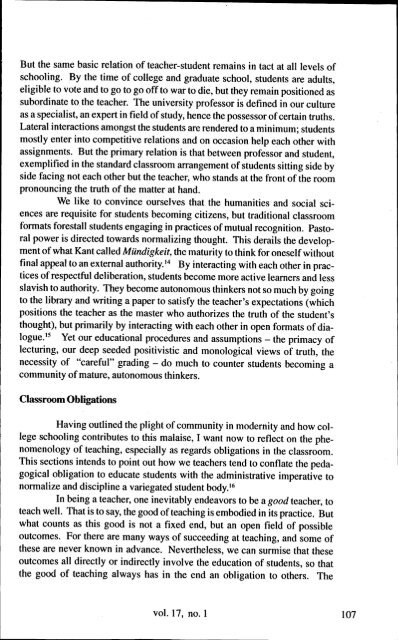Art Criticism - The State University of New York
Art Criticism - The State University of New York
Art Criticism - The State University of New York
Create successful ePaper yourself
Turn your PDF publications into a flip-book with our unique Google optimized e-Paper software.
But the same basic relation <strong>of</strong> teacher-student remains in tact at all levels <strong>of</strong><br />
schooling. By the time <strong>of</strong> college and graduate school, students are adults,<br />
eligible to vote and to go to go <strong>of</strong>f to war to die, but they remain positioned as<br />
subordinate to the teacher. <strong>The</strong> university pr<strong>of</strong>essor is defined in our culture<br />
as a specialist, an expert in field <strong>of</strong> study, hence the possessor <strong>of</strong> certain truths.<br />
Lateral interactions amongst the students are rendered to a minimum; students<br />
mostly enter into competitive relations and on occasion help each other with<br />
assignments. But the primary relation is that between pr<strong>of</strong>essor and student,<br />
exemplified in the standard classroom arrangement <strong>of</strong> students sitting side by<br />
side facing not each other but the teacher, who stands at the front <strong>of</strong> the room<br />
pronouncing the truth <strong>of</strong> the matter at hand.<br />
We like to convince ourselves that the humanities and social sciences<br />
are requisite for students becoming citizens, but traditional classroom<br />
formats forestall students engaging in practices <strong>of</strong> mutual recognition. Pastoral<br />
power is directed towards normalizing thought. This derails the development<br />
<strong>of</strong> what Kant called Miindigkeit, the maturity to think for oneself without<br />
final appeal to an external authority. 14 By interacting with each other in practices<br />
<strong>of</strong> respectful deliberation, students become more active learners and less<br />
slavish to authority. <strong>The</strong>y become autonomous thinkers not so much by going<br />
to the library and writing a paper to satisfy the teacher's expectations (which<br />
positions the teacher as the master who authorizes the truth <strong>of</strong> the student's<br />
thought), but primarily by interacting with each other in open formats <strong>of</strong> dia-<br />
10gue. IS Yet our educational procedures and assumptions - the primacy <strong>of</strong><br />
lecturing, our deep seeded positivistic and monological views <strong>of</strong> truth, the<br />
necessity <strong>of</strong> "careful" grading - do much to counter students becoming a<br />
community <strong>of</strong> mature, autonomous thinkers.<br />
Classroom Obligations<br />
Having outlined the plight <strong>of</strong> community in modernity and how college<br />
schooling contributes to this malaise, I want now to reflect on the phenomenology<br />
<strong>of</strong> teaching, especially as regards obligations in the classroom.<br />
This sections intends to point out how we teachers tend to conflate the pedagogical<br />
obligation to educate students with the administrative imperative to<br />
normalize and discipline a variegated student body.16<br />
In being a teacher, one inevitably endeavors to be a good teacher, to<br />
teach well. That is to say, the good <strong>of</strong> teaching is embodied in its practice. But<br />
what counts as this good is not a fixed end, but an open field <strong>of</strong> possible<br />
outcomes. For there are many ways <strong>of</strong> succeeding at teaching, and some <strong>of</strong><br />
these are never known in advance. Nevertheless, we can surmise that these<br />
outcomes all directly or indirectly involve the education <strong>of</strong> students, so that<br />
the good <strong>of</strong> teaching always has in the end an obligation to others. <strong>The</strong><br />
vol. 17, no. 1 107
















